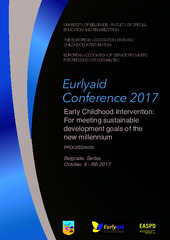Приказ основних података о документу
Predictors of Quality of Life of Families with Children with Cerebral Palsy – Implication for Early Intervention
| dc.contributor | Filipović Mirko | |
| dc.contributor | Brojčin Branislav | |
| dc.creator | Milićević, Milena | |
| dc.creator | Nedović, Goran | |
| dc.date.accessioned | 2021-06-17T13:40:25Z | |
| dc.date.available | 2021-06-17T13:40:25Z | |
| dc.date.issued | 2017 | |
| dc.identifier.isbn | 978-86-6203-101-3 | |
| dc.identifier.uri | http://rfasper.fasper.bg.ac.rs/handle/123456789/2804 | |
| dc.description.abstract | Research subject: During the last two decades, families have been increasingly encouraged to take continuous care of their child with cerebral palsy. Consequently, the way of changing of family life and its quality has become a research subject in disability studies. Method: Te aim of this study was to explore the impact of child, family, environment and service support characteristics as potential predictors on the quality of life in families with children with cerebral palsy residing in the Republic of Serbia. Te sample was recruited using convenience sampling and consisted of 110 families of children with cerebral palsy, of both genders, between 7 and 18 years of age (M=12,67, SD=3,41). A hierarchical multiple regression was calculated to predict family quality of life based on four sets of independent variables. Child and family characteristics, frequency and magnitude of perceived physical, attitudinal, and policy barriers, and parental perceptions and experiences with professional support were included. Results: Child’s challenging behavior was one of the strongest predictors of the quality of family life, b=-.29, t (106)=-3.18, p<.01. Te household income also accounted for a signifcant proportion of unique variance in predicting the quality of family life, b=-.21, t(106)=-2.17, p<.05. Moreover, household income was no longer a signifcant predictor when the extent of challenging behavior exhibited by the child and the magnitude of perceived environmental barriers entered the regression model. Te results confrm that household income and perceived everyday care-giving difculties are associated with the reduced quality of family life. Conclusion: Te conclusion underlines the importance of the environment in improving the quality of family life. However, the reinforcing intervention in the domain of environmental barriers could contribute to the quality of family life by overcoming the lower income and behavioral problems. | |
| dc.language | en | |
| dc.publisher | University of Belgrade, Faculty of Special Education and Rehabilitation, Serbia / Univerzitet u Beogradu – Fakultet za specijalnu edukaciju i rehabilitaciju | |
| dc.relation | info:eu-repo/grantAgreement/MESTD/Integrated and Interdisciplinary Research (IIR or III)/47011/RS// | |
| dc.rights | openAccess | |
| dc.rights.uri | https://creativecommons.org/licenses/by-sa/4.0/ | |
| dc.source | Proceedings- Eurlyaid Conference 2017 „ Early Childhood Intervention: For meeting sustainable development goals of the new millennium “, Beograd, Srbija, 06–08. 10.2017. | |
| dc.subject | quality of family life | |
| dc.subject | cerebral palsy | |
| dc.subject | predicting | |
| dc.subject | environmental impact | |
| dc.title | Predictors of Quality of Life of Families with Children with Cerebral Palsy – Implication for Early Intervention | en |
| dc.type | conferenceObject | |
| dc.rights.license | BY-SA | |
| dc.citation.epage | 126 | |
| dc.citation.other | http://www.icf.fasper.bg.ac.rs/zbornici/20171103_2-Proceedings%202017.pdf | |
| dc.citation.spage | 117 | |
| dc.identifier.fulltext | http://rfasper.fasper.bg.ac.rs/bitstream/id/5644/Untitled15.pdf | |
| dc.identifier.rcub | https://hdl.handle.net/21.15107/rcub_rfasper_2804 | |
| dc.type.version | publishedVersion |


